Caffeine isn’t just for morning lattes or staying awake during late nights. It plays a fascinating role in the human body beyond just giving an energy zap. Think of it as the behind-the-scenes director orchestrating various body functions.
First off, let’s talk about how caffeine interacts with the central nervous system. It blocks a neurotransmitter called adenosine, which normally makes us feel drowsy. By doing this, caffeine keeps us alert and can even improve our attention span, making it a hit not just in coffee cups but in social and work settings alike.
But there’s more to caffeine than meets the eye. It’s got its hands in regulating mood, burning fat, and potentially boosting physical performance. By tweaking the way our neurotransmitters work, caffeine might even beat those post-lunch blues or give a slight edge in workouts.
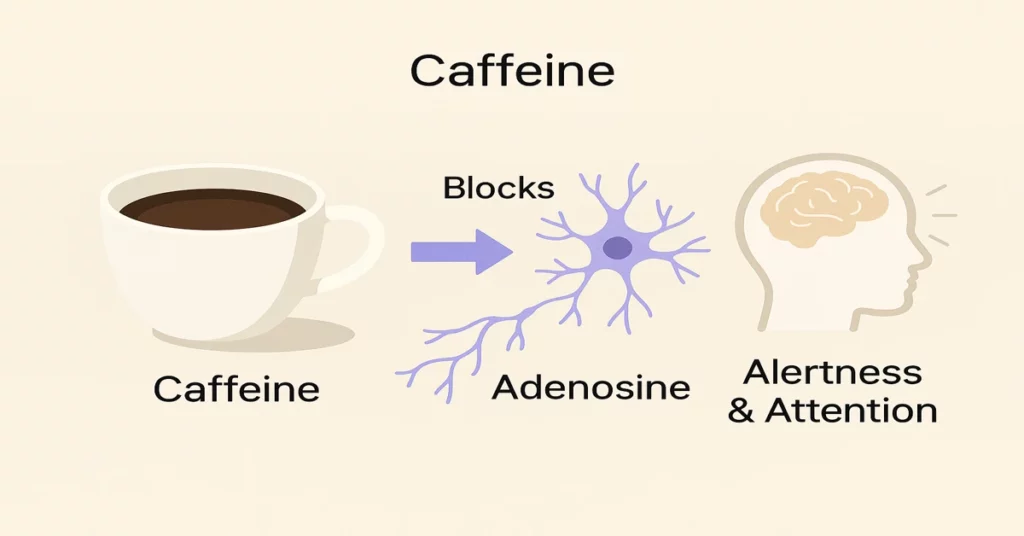
Of course, moderation is key. While caffeine has its perks, too much can lead to side effects like jitters, insomnia, or even heart palpitations. Balance is vital to make the most of its benefits without going over the edge.
Understanding these aspects of caffeine helps in seeing why some think it might affect things like hair growth. With such an impactful role in the body, it’s no wonder researchers are looking into its broader effects.
☕ The Science Behind Caffeine and Hair Follicles
Caffeine’s journey from your cup to the cellular workings of your hair follicles is nothing short of intriguing. Ever wonder what happens when caffeine meets your scalp? At the cellular level, caffeine is believed to influence crucial processes within hair follicles that could boost their performance.
Inside those tiny hair-producing factories on your scalp, caffeine’s potential action is thought to involve prolonging the anagen, or growth phase, of the hair cycle. This longer growth phase might mean thicker and more robust hair, especially appealing to anyone dealing with thinning locks.
Now, let’s touch on how caffeine’s possible hair benefits tie into its role in combating androgenetic alopecia. This condition, especially common in men, results from hair follicles shrinking over time. Some think caffeine might counteract this by blocking the effects of DHT – a hormone linked to hair loss.
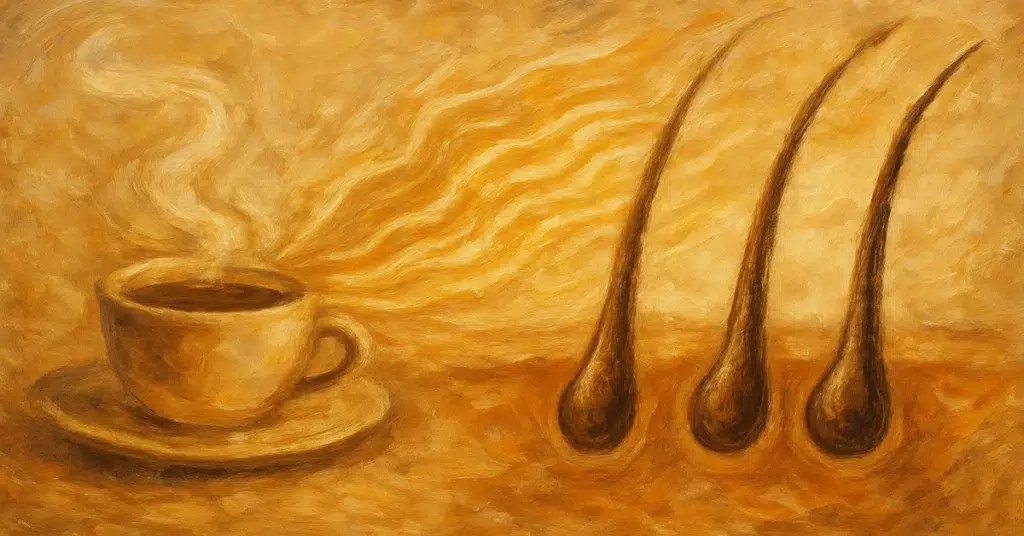
While theoretical, this makes caffeine an exciting research subject. Still, it’s a complex area where the interactions between various biological factors play a significant role. Exploring caffeine’s potential means looking into how it might support those follicles and ward off common hair issues.
It’s worth noting that while the science is compelling, hair growth is affected by a range of factors. So, keeping stress in check, maintaining a nutritious diet, and considering other topical treatments alongside caffeine could offer a more comprehensive approach to sustaining healthy hair.
🧪 Scientific Evidence: Does Caffeine Promote Hair Growth?
When it comes to caffeine’s role in hair growth, scientific studies bring some clarity, though not without questions. Several pieces of research suggest caffeine might stimulate hair growth, but what’s the real deal?
Studies in petri dishes show that caffeine can impact human hair follicles. One popular study demonstrated prolonged hair growth cycles in follicles treated with caffeine, grabbing attention in the hair care world. But remember, lab conditions don’t always mirror real-world scenarios.
Then there’s the topic of applying caffeine versus sipping it. Topical application in the form of shampoos or serums ensures that the caffeine reaches the hair follicles directly, unlike when ingested. This means not all hair benefits found in studies suggest that drinking coffee will result in famed Rapunzel locks!
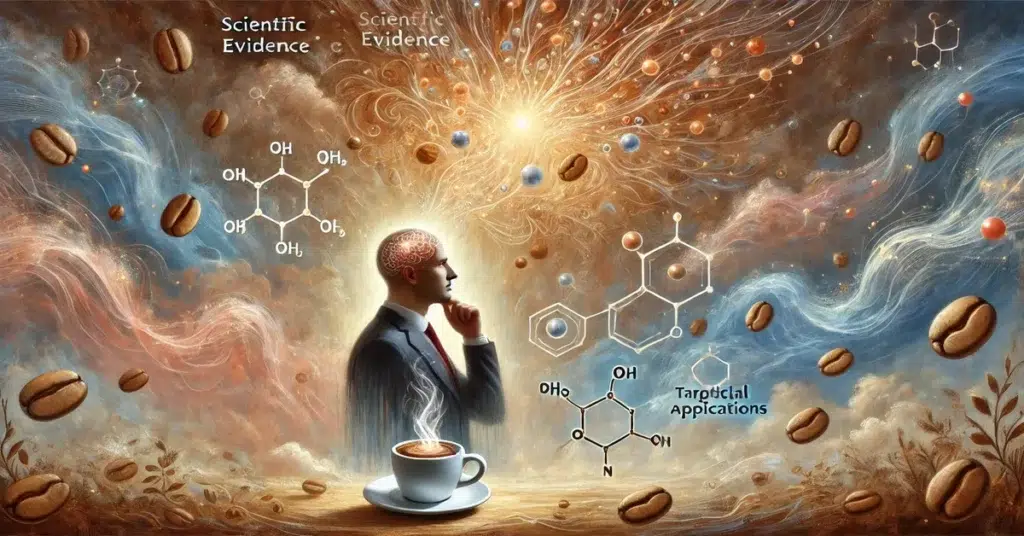
Weighing the evidence, it appears that using caffeine on hair may offer some benefits, but it’s not a standalone solution. The research is encouraging, yet limited. Don’t forget to manage expectations and maintain a balanced view. Advanced hair growth often requires a combination of proven strategies, beyond just caffeine. Combining caffeine with a broader, holistic approach often unlocks the true potential for hair regrowth.
Targeted strategies such as using anti-stress supplements, applying minoxidil-enriched products, and choosing shampoos with natural growth-stimulating ingredients can create a powerful synergy.
Caffeine plays its part, but the real magic happens when the entire ecosystem of scalp health, stress reduction, and targeted therapy works together in harmony.
In a sea of hair growth products, it’s easy to get lost in enchantment stories of instant results. Keeping grounded in factual evidence helps maintain a clear perspective on the potential and limitations of caffeine-based hair treatments. Keep one foot in reality while exploring caffeine’s proposed benefits on your mane.
🧴 Caffeine-Infused Hair Products: Efficacy and Marketing
Caffeine shampoos and hair treatments have flooded the market with promises of revitalizing your scalp and enhancing hair growth. But do they genuinely live up to the hype or are they just clever marketing ploys? Let’s unravel that mystery.
Theoretically, applying caffeine directly to the scalp delivers it straight to the hair follicles, maximizing potential benefits. However, the concentration of caffeine required to actually affect hair growth processes is a big question mark. Some scientists argue that many consumer products don’t meet the necessary potency to make a marked difference.
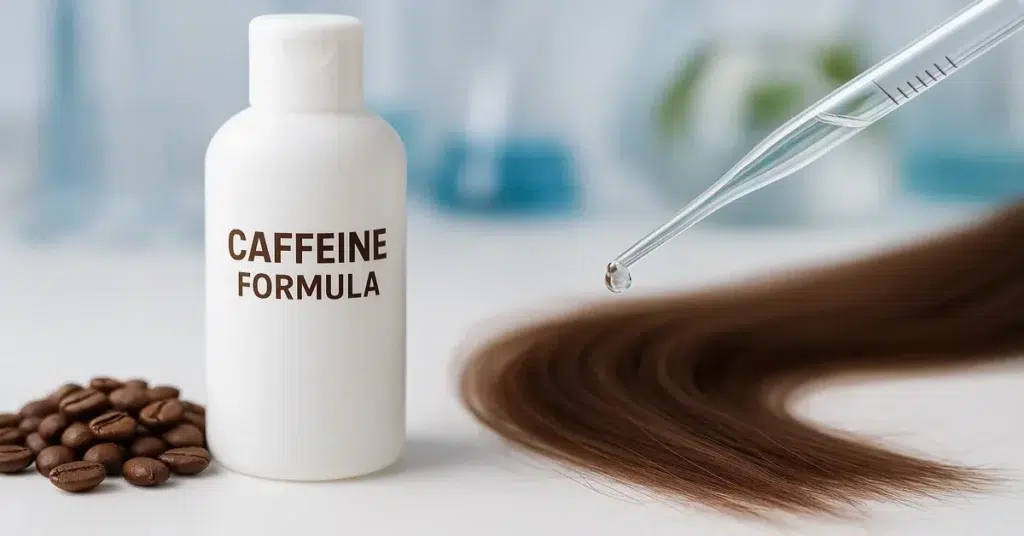
It’s crucial to look past the glossy packaging and enthusiastic brand claims. Real consumer experiences can shed light on possible outcomes. While some folks report shinier, fuller feeling hair, others might not notice substantial changes. This mixed bag of reviews highlights the individual variability in response to topical caffeine treatments.
The marketing game often plays on popular myths, feeding into our desire for quick fixes. Top-notch advertising can sometimes blur the lines between facts and fiction, making it hard to distinguish substantial improvements from placebo effects.
Finding a reliable caffeine-based product should involve checking ingredient lists and understanding the concentrations involved. If you’re considering such treatments, pair them with a holistic hair care approach. That means balancing diet, stress, and overall health to offer those hair follicles deluxe support.
🌿 Alternatives and Complementary Treatments for Hair Health
Exploring beyond caffeine, there are several well-researched options for those keen on boosting hair health. A practical approach often involves embracing more than one solution.
Minoxidil is one of the most tested topical treatments for hair growth. It’s FDA-approved and known for its efficacy, particularly in cases of pattern baldness. Use it consistently as part of a broader regimen for best outcomes.
Nutrition shouldn’t be overlooked. Hair thrives with a diet rich in essential vitamins and minerals. Biotin, vitamin D, and omega-3 fatty acids support hair structure and growth from the inside out.
Laser therapy devices are another option. These devices aim low-level light at the scalp, potentially stimulating hair growth though the evidence varies widely. When used as part of a comprehensive hair care plan, laser therapy can significantly amplify results.
Its ability to stimulate blood circulation and energize dormant follicles becomes even more effective when combined with topical treatments like minoxidil, caffeine-based serums, and a strong nutritional foundation.
Rather than relying on a single solution, the most successful strategies layer multiple scientifically supported methods to create optimal conditions for steady, visible improvements.
Don’t underestimate the power of prevention. Gentle hair care practices help maintain what you have. Using wide-tooth combs, avoiding excessive heat, and protecting hair from harsh environmental factors are basics.
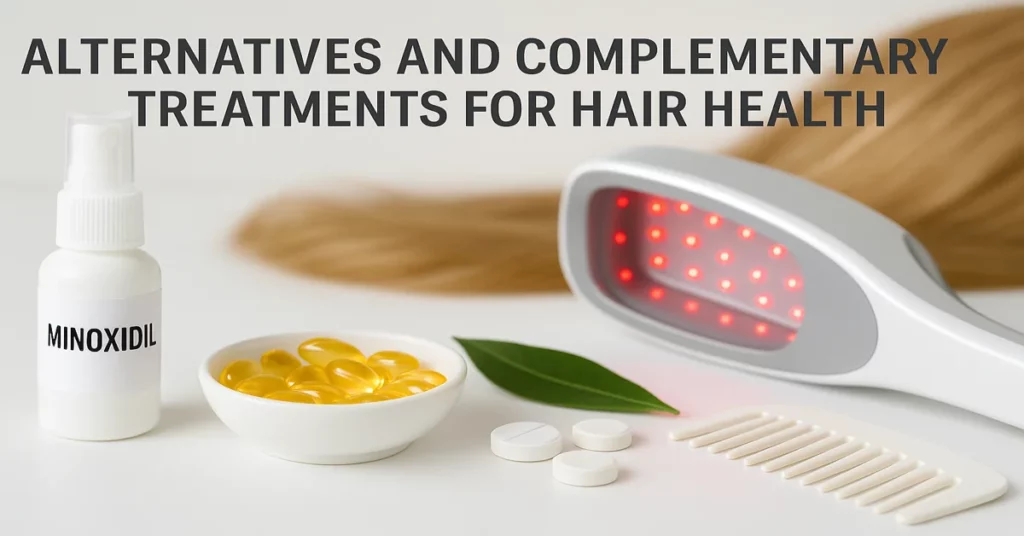
Consider maintaining consults with dermatologists or trichologists. They can offer tailored advice and treatments that align with individual hair health goals.
Pair caffeine treatments, if you choose them, with a regimen that acknowledges and supports hair’s complex ecosystem. It’s about creating an environment where hair can truly thrive. Beyond supplements and topical treatments, embracing a truly holistic lifestyle makes a crucial difference.
Minimizing exposure to stressful environments, avoiding processed and fast foods, limiting sugary sodas, and spending more time in nature and fresh air can significantly boost both hair vitality and overall well-being.
Healthy hair thrives in a healthy body — and a balanced, mindful life often becomes the ultimate secret ingredient for long-term success. In the end, true hair recovery rarely depends on a single magic ingredient.
It’s the synergy between smart choices — managing stress, nourishing the body, using proven topical treatments, and embracing holistic, science-backed therapies — that builds a real, lasting foundation for hair health.
Every small step strengthens the bigger journey toward stronger, fuller hair.
Stay with us — the best is yet to come.
By following our advice, you’re doing the most you can for your hair.
Be the first to know when we publish new guides, tests, and proven strategies for stronger, healthier hair.
👉 Visit the About Me page to learn more about my journey, mission, and why helping people with hair health is so personal to me.
Want healthier, stronger hair? Discover 8 science-backed habits that protect your scalp and boost natural growth. Get your free PDF guide today!
Disclaimer: This article is for informational purposes only and is not a substitute for professional medical advice. Sensitive claims are supported with scientific references, and full product details can always be found on the official websites of the respective manufacturers or distributors.
Some links in this article are affiliate links. If you choose to make a purchase through them, I may earn a small commission at no extra cost to you — helping me keep HairGrowGenius running. Thank you for your support!

❓ FAQ: Caffeine and Hair Growth
☕ Can caffeine actually help hair grow?
Yes, research shows that caffeine can stimulate hair follicles by counteracting DHT’s effects and prolonging the growth phase — especially when applied topically.
🧴 Is drinking coffee enough to improve hair growth?
Not really. The amount of caffeine that reaches hair follicles through coffee consumption is minimal. Topical application via shampoos or serums is more effective
🔬 How does caffeine block DHT?
Caffeine doesn’t block DHT directly, but it can help reduce its negative effects on hair follicles by stimulating cell energy and promoting root activity.
🧠 Are caffeine shampoos safe for daily use?
Yes, most caffeine shampoos are safe for daily use, especially when formulated without sulfates or harsh chemicals. They work best with consistent use over time.
🧾 Last updated: June 2025 based on trichological and dermatological studies.


Leave a Reply